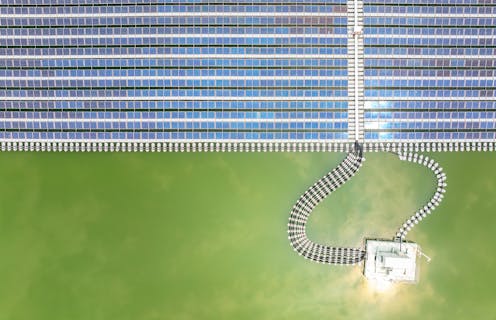From waste to power: how floating solar panels on wastewater ponds could help solve NZ’s electricity security crisis
- Written by The Conversation

Wastewater ponds may seem an unlikely place to look for solutions to New Zealand’s electricity security crisis. But their underutilised surfaces could help tackle two problems at once – high power prices and algal growth.
Floating solar panels on wastewater ponds offer a multifaceted answer. They generate renewable energy, improve water quality in the treatment ponds and reduce costs.
Leading this approach is the 2020 installation of New Zealand’s first floating solar array at the Rosedale wastewater treatment plant in Auckland. This project demonstrates how New Zealand could double the country’s power supply without requiring additional land. It serves as a test for future deployments on other reservoirs and dams.
The project comprises 2,700 solar panels and 4,000 floating pontoons. It covers one hectare of the treatment pond, making excellent use of a marginal land asset in a dense urban environment.
The floating solar array generates 1,040 kilowatts of electricity and reduces 145 tonnes of carbon dioxide annually. It also saves NZ$4.5 million in electricity costs per year. The electricity it generates, alongside biogas co-generation, meets 25% of the plant’s energy needs.
The project represents the first use of floating solar and the first megawatt-sized solar project in the country. As energy prices soar and environmental pressures mount, it is time to start exploring innovative solutions with the resources we already have.
Wastewater ponds provide underused surface
New Zealand is currently grappling with an electricity crisis, marked by increasing demand, aging infrastructure and a challenging transition to renewable energy sources.
The country relies heavily on hydroelectric power. This makes it particularly vulnerable during periods of low water levels in hydro lakes, especially in winter. This in turn leads to frequent supply shortfalls and, combined with diminishing gas supplies, to rising electricity prices.
As New Zealand intensifies its efforts to integrate more renewable energy, we need innovative solutions to stabilise the grid and meet growing energy demands.
One underutilised resource lies in wastewater treatment ponds. New Zealand has more than 200 wastewater ponds, chosen for their simplicity and low operational costs. They remain the most common form of wastewater treatment because they are robust, require low energy, cope with high water and waste loads and provide buffer storage to avoid applying agricultural effluent to wet soils.
However, because of the high surface area and nutrient-rich environment, algal growth is one of the biggest issues with waste stabilisation ponds. This is exacerbated on days with high sunshine levels and warmer water temperatures. It complicates the treatment process and necessitates costly chemical interventions.
An opportunity for New Zealand
My background is in entrepreneurship and innovation and the idea of floating solar panels on New Zealand’s expansive wastewater ponds represents an untapped opportunity.
Apart from generating power and preventing algal growth, the solar panels provide shade that keeps the water cooler and reduces evaporation. This is critical for maintaining effective wastewater treatment.
Utility-scale solar panels are now recognised as the cheapest form of energy, with rapidly declining costs over the past five years.
While relatively new to New Zealand, floating solar panels have shown significant advantages in other parts of the world. New Zealand may be held back by a misconception that solar panels work best in hot and sunny climates. In fact, solar panels harness the sun’s energy – not its temperature – making New Zealand’s cooler climate an ideal environment for efficient solar energy generation.
Given New Zealand uses more energy per capita than 17 of our 30 OECD peers, floating solar panels on wastewater ponds could set an example for how we tackle energy and environmental challenges.
By turning underutilised spaces into power-generating assets, we not only address immediate needs but also pave the way for a more sustainable, resilient future.







